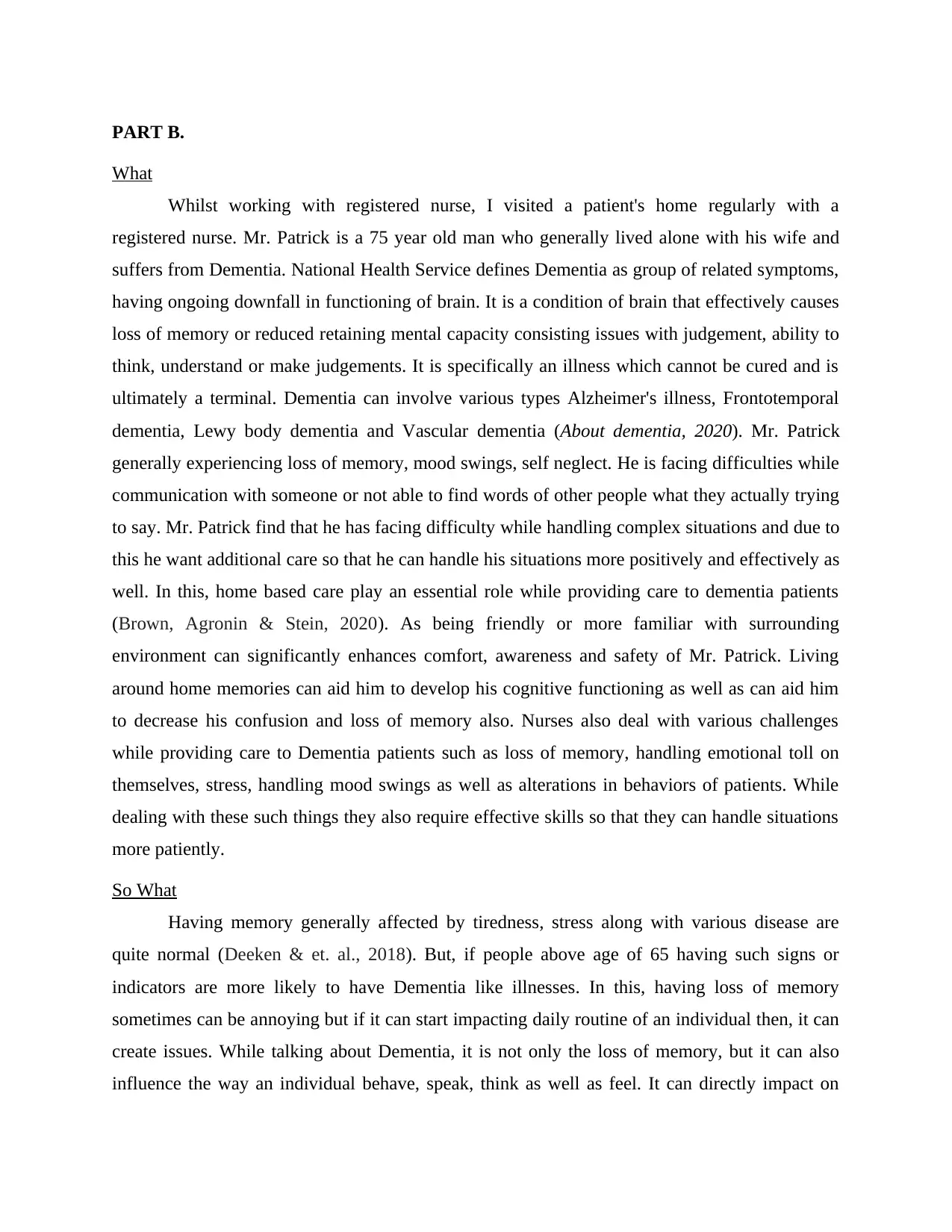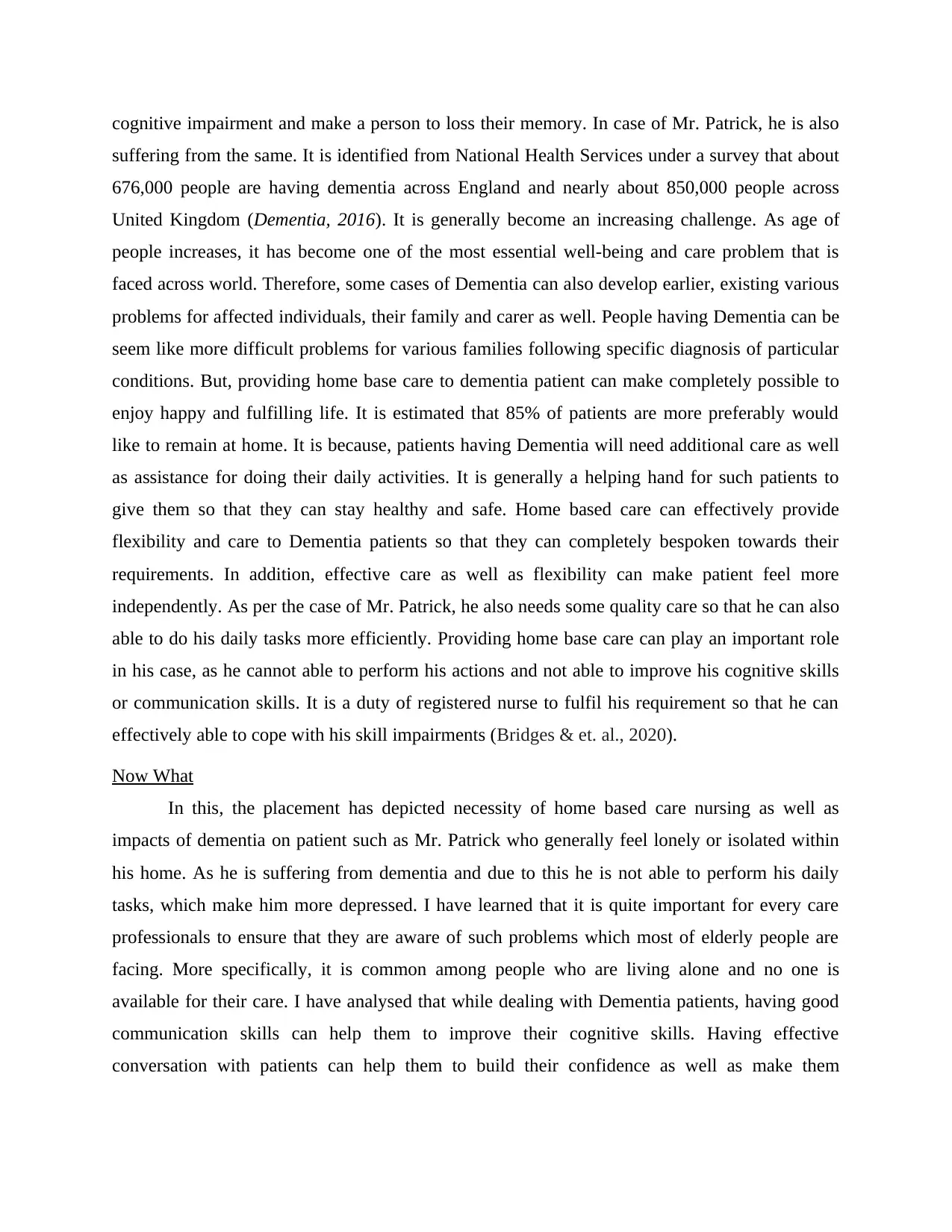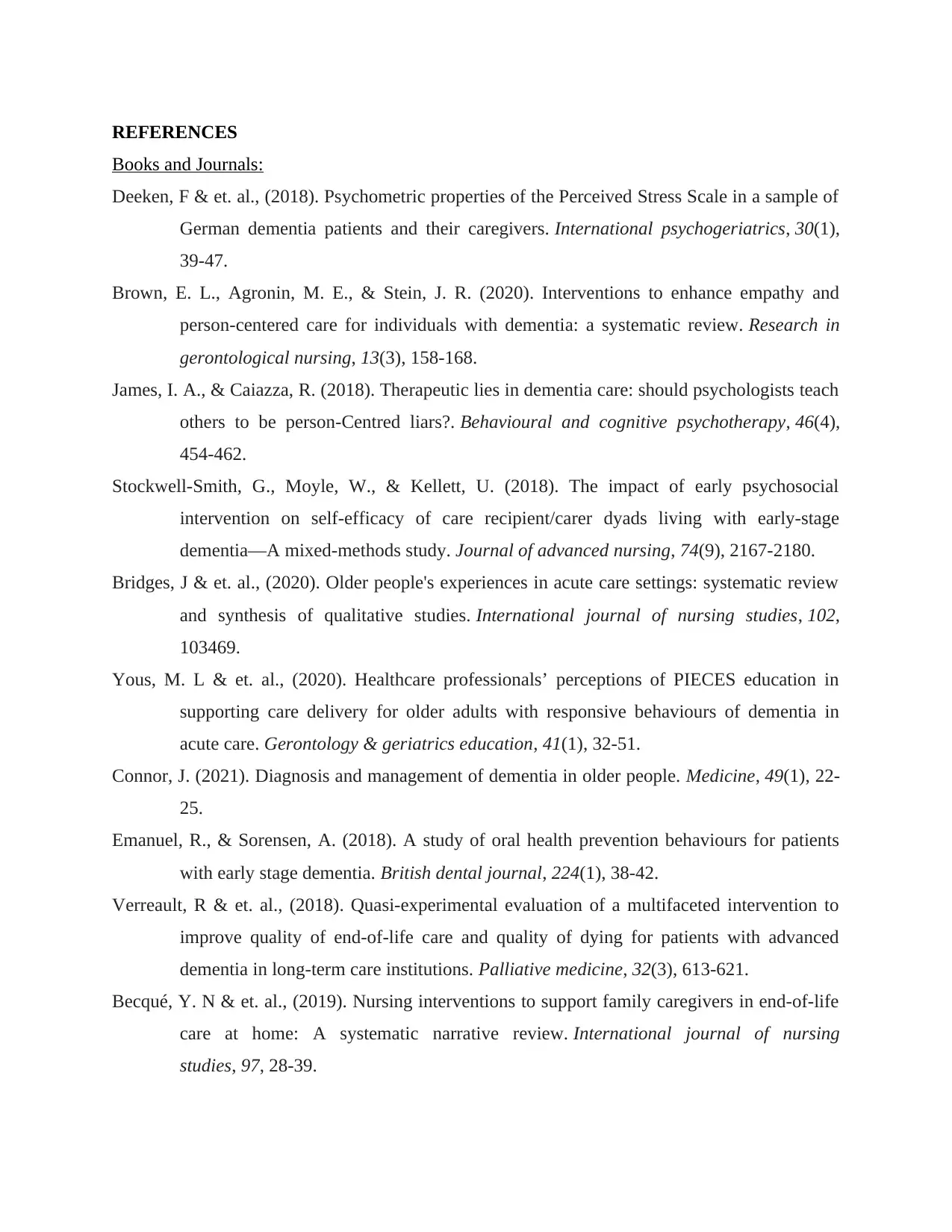Exploring Home-Based Care for Dementia Patients: A Nursing Perspective
VerifiedAdded on 2023/06/14
|7
|1608
|286
Report
AI Summary
This report delves into the critical role of home-based nursing care for dementia patients, focusing on the experiences of a 75-year-old patient named Mr. Patrick. The report highlights the challenges faced by dementia patients, such as memory loss, mood swings, and communication difficulties, and emphasizes the importance of familiar home environments in enhancing their comfort and cognitive function. It also addresses the challenges nurses face, including managing patient behaviors and emotional stress, and underscores the necessity of effective communication skills. The placement experience revealed the importance of awareness among care professionals regarding the problems faced by elderly individuals living alone, and it highlights how building strong relationships and understanding patient needs can significantly improve their quality of life and independence. The report concludes that home-based care, facilitated by skilled nurses, plays a vital role in enabling dementia patients to lead fulfilling lives while managing their condition effectively.

PART B.
Paraphrase This Document
Need a fresh take? Get an instant paraphrase of this document with our AI Paraphraser

Table of Contents
PART B............................................................................................................................................3
What.......................................................................................................................................3
So What..................................................................................................................................3
Now What...............................................................................................................................3
REFERENCES................................................................................................................................4
PART B............................................................................................................................................3
What.......................................................................................................................................3
So What..................................................................................................................................3
Now What...............................................................................................................................3
REFERENCES................................................................................................................................4

PART B.
What
Whilst working with registered nurse, I visited a patient's home regularly with a
registered nurse. Mr. Patrick is a 75 year old man who generally lived alone with his wife and
suffers from Dementia. National Health Service defines Dementia as group of related symptoms,
having ongoing downfall in functioning of brain. It is a condition of brain that effectively causes
loss of memory or reduced retaining mental capacity consisting issues with judgement, ability to
think, understand or make judgements. It is specifically an illness which cannot be cured and is
ultimately a terminal. Dementia can involve various types Alzheimer's illness, Frontotemporal
dementia, Lewy body dementia and Vascular dementia (About dementia, 2020). Mr. Patrick
generally experiencing loss of memory, mood swings, self neglect. He is facing difficulties while
communication with someone or not able to find words of other people what they actually trying
to say. Mr. Patrick find that he has facing difficulty while handling complex situations and due to
this he want additional care so that he can handle his situations more positively and effectively as
well. In this, home based care play an essential role while providing care to dementia patients
(Brown, Agronin & Stein, 2020). As being friendly or more familiar with surrounding
environment can significantly enhances comfort, awareness and safety of Mr. Patrick. Living
around home memories can aid him to develop his cognitive functioning as well as can aid him
to decrease his confusion and loss of memory also. Nurses also deal with various challenges
while providing care to Dementia patients such as loss of memory, handling emotional toll on
themselves, stress, handling mood swings as well as alterations in behaviors of patients. While
dealing with these such things they also require effective skills so that they can handle situations
more patiently.
So What
Having memory generally affected by tiredness, stress along with various disease are
quite normal (Deeken & et. al., 2018). But, if people above age of 65 having such signs or
indicators are more likely to have Dementia like illnesses. In this, having loss of memory
sometimes can be annoying but if it can start impacting daily routine of an individual then, it can
create issues. While talking about Dementia, it is not only the loss of memory, but it can also
influence the way an individual behave, speak, think as well as feel. It can directly impact on
What
Whilst working with registered nurse, I visited a patient's home regularly with a
registered nurse. Mr. Patrick is a 75 year old man who generally lived alone with his wife and
suffers from Dementia. National Health Service defines Dementia as group of related symptoms,
having ongoing downfall in functioning of brain. It is a condition of brain that effectively causes
loss of memory or reduced retaining mental capacity consisting issues with judgement, ability to
think, understand or make judgements. It is specifically an illness which cannot be cured and is
ultimately a terminal. Dementia can involve various types Alzheimer's illness, Frontotemporal
dementia, Lewy body dementia and Vascular dementia (About dementia, 2020). Mr. Patrick
generally experiencing loss of memory, mood swings, self neglect. He is facing difficulties while
communication with someone or not able to find words of other people what they actually trying
to say. Mr. Patrick find that he has facing difficulty while handling complex situations and due to
this he want additional care so that he can handle his situations more positively and effectively as
well. In this, home based care play an essential role while providing care to dementia patients
(Brown, Agronin & Stein, 2020). As being friendly or more familiar with surrounding
environment can significantly enhances comfort, awareness and safety of Mr. Patrick. Living
around home memories can aid him to develop his cognitive functioning as well as can aid him
to decrease his confusion and loss of memory also. Nurses also deal with various challenges
while providing care to Dementia patients such as loss of memory, handling emotional toll on
themselves, stress, handling mood swings as well as alterations in behaviors of patients. While
dealing with these such things they also require effective skills so that they can handle situations
more patiently.
So What
Having memory generally affected by tiredness, stress along with various disease are
quite normal (Deeken & et. al., 2018). But, if people above age of 65 having such signs or
indicators are more likely to have Dementia like illnesses. In this, having loss of memory
sometimes can be annoying but if it can start impacting daily routine of an individual then, it can
create issues. While talking about Dementia, it is not only the loss of memory, but it can also
influence the way an individual behave, speak, think as well as feel. It can directly impact on
⊘ This is a preview!⊘
Do you want full access?
Subscribe today to unlock all pages.

Trusted by 1+ million students worldwide

cognitive impairment and make a person to loss their memory. In case of Mr. Patrick, he is also
suffering from the same. It is identified from National Health Services under a survey that about
676,000 people are having dementia across England and nearly about 850,000 people across
United Kingdom (Dementia, 2016). It is generally become an increasing challenge. As age of
people increases, it has become one of the most essential well-being and care problem that is
faced across world. Therefore, some cases of Dementia can also develop earlier, existing various
problems for affected individuals, their family and carer as well. People having Dementia can be
seem like more difficult problems for various families following specific diagnosis of particular
conditions. But, providing home base care to dementia patient can make completely possible to
enjoy happy and fulfilling life. It is estimated that 85% of patients are more preferably would
like to remain at home. It is because, patients having Dementia will need additional care as well
as assistance for doing their daily activities. It is generally a helping hand for such patients to
give them so that they can stay healthy and safe. Home based care can effectively provide
flexibility and care to Dementia patients so that they can completely bespoken towards their
requirements. In addition, effective care as well as flexibility can make patient feel more
independently. As per the case of Mr. Patrick, he also needs some quality care so that he can also
able to do his daily tasks more efficiently. Providing home base care can play an important role
in his case, as he cannot able to perform his actions and not able to improve his cognitive skills
or communication skills. It is a duty of registered nurse to fulfil his requirement so that he can
effectively able to cope with his skill impairments (Bridges & et. al., 2020).
Now What
In this, the placement has depicted necessity of home based care nursing as well as
impacts of dementia on patient such as Mr. Patrick who generally feel lonely or isolated within
his home. As he is suffering from dementia and due to this he is not able to perform his daily
tasks, which make him more depressed. I have learned that it is quite important for every care
professionals to ensure that they are aware of such problems which most of elderly people are
facing. More specifically, it is common among people who are living alone and no one is
available for their care. I have analysed that while dealing with Dementia patients, having good
communication skills can help them to improve their cognitive skills. Having effective
conversation with patients can help them to build their confidence as well as make them
suffering from the same. It is identified from National Health Services under a survey that about
676,000 people are having dementia across England and nearly about 850,000 people across
United Kingdom (Dementia, 2016). It is generally become an increasing challenge. As age of
people increases, it has become one of the most essential well-being and care problem that is
faced across world. Therefore, some cases of Dementia can also develop earlier, existing various
problems for affected individuals, their family and carer as well. People having Dementia can be
seem like more difficult problems for various families following specific diagnosis of particular
conditions. But, providing home base care to dementia patient can make completely possible to
enjoy happy and fulfilling life. It is estimated that 85% of patients are more preferably would
like to remain at home. It is because, patients having Dementia will need additional care as well
as assistance for doing their daily activities. It is generally a helping hand for such patients to
give them so that they can stay healthy and safe. Home based care can effectively provide
flexibility and care to Dementia patients so that they can completely bespoken towards their
requirements. In addition, effective care as well as flexibility can make patient feel more
independently. As per the case of Mr. Patrick, he also needs some quality care so that he can also
able to do his daily tasks more efficiently. Providing home base care can play an important role
in his case, as he cannot able to perform his actions and not able to improve his cognitive skills
or communication skills. It is a duty of registered nurse to fulfil his requirement so that he can
effectively able to cope with his skill impairments (Bridges & et. al., 2020).
Now What
In this, the placement has depicted necessity of home based care nursing as well as
impacts of dementia on patient such as Mr. Patrick who generally feel lonely or isolated within
his home. As he is suffering from dementia and due to this he is not able to perform his daily
tasks, which make him more depressed. I have learned that it is quite important for every care
professionals to ensure that they are aware of such problems which most of elderly people are
facing. More specifically, it is common among people who are living alone and no one is
available for their care. I have analysed that while dealing with Dementia patients, having good
communication skills can help them to improve their cognitive skills. Having effective
conversation with patients can help them to build their confidence as well as make them
Paraphrase This Document
Need a fresh take? Get an instant paraphrase of this document with our AI Paraphraser

independent so that they can effectively do their tasks without need any help (Becqué & et. al.,
2019).
From my experience while providing care, I have gained broad amount of knowledge,
understanding as well as important skills that have forced me to acquire various new ways of
working so that I can effectively provide care towards patients. It is determined by me that how I
can build an effective relationship with patients by having good communication. In addition, I
also learned with my experience that what actually are needs of Dementia patients and how can I
help them to handle specific conditions or situations so that if they face any difficulty in future
then know that how it can be handled (Connor, 2021). Furthermore, I have learned that while
dealing with specific issues of Dementia patients, I have effectively developed my skills and due
to this, it helped Mr. Patrick to overcome or deal with their daily living tasks.
2019).
From my experience while providing care, I have gained broad amount of knowledge,
understanding as well as important skills that have forced me to acquire various new ways of
working so that I can effectively provide care towards patients. It is determined by me that how I
can build an effective relationship with patients by having good communication. In addition, I
also learned with my experience that what actually are needs of Dementia patients and how can I
help them to handle specific conditions or situations so that if they face any difficulty in future
then know that how it can be handled (Connor, 2021). Furthermore, I have learned that while
dealing with specific issues of Dementia patients, I have effectively developed my skills and due
to this, it helped Mr. Patrick to overcome or deal with their daily living tasks.

REFERENCES
Books and Journals:
Deeken, F & et. al., (2018). Psychometric properties of the Perceived Stress Scale in a sample of
German dementia patients and their caregivers. International psychogeriatrics, 30(1),
39-47.
Brown, E. L., Agronin, M. E., & Stein, J. R. (2020). Interventions to enhance empathy and
person-centered care for individuals with dementia: a systematic review. Research in
gerontological nursing, 13(3), 158-168.
James, I. A., & Caiazza, R. (2018). Therapeutic lies in dementia care: should psychologists teach
others to be person-Centred liars?. Behavioural and cognitive psychotherapy, 46(4),
454-462.
Stockwell‐Smith, G., Moyle, W., & Kellett, U. (2018). The impact of early psychosocial
intervention on self‐efficacy of care recipient/carer dyads living with early‐stage
dementia—A mixed‐methods study. Journal of advanced nursing, 74(9), 2167-2180.
Bridges, J & et. al., (2020). Older people's experiences in acute care settings: systematic review
and synthesis of qualitative studies. International journal of nursing studies, 102,
103469.
Yous, M. L & et. al., (2020). Healthcare professionals’ perceptions of PIECES education in
supporting care delivery for older adults with responsive behaviours of dementia in
acute care. Gerontology & geriatrics education, 41(1), 32-51.
Connor, J. (2021). Diagnosis and management of dementia in older people. Medicine, 49(1), 22-
25.
Emanuel, R., & Sorensen, A. (2018). A study of oral health prevention behaviours for patients
with early stage dementia. British dental journal, 224(1), 38-42.
Verreault, R & et. al., (2018). Quasi-experimental evaluation of a multifaceted intervention to
improve quality of end-of-life care and quality of dying for patients with advanced
dementia in long-term care institutions. Palliative medicine, 32(3), 613-621.
Becqué, Y. N & et. al., (2019). Nursing interventions to support family caregivers in end-of-life
care at home: A systematic narrative review. International journal of nursing
studies, 97, 28-39.
Books and Journals:
Deeken, F & et. al., (2018). Psychometric properties of the Perceived Stress Scale in a sample of
German dementia patients and their caregivers. International psychogeriatrics, 30(1),
39-47.
Brown, E. L., Agronin, M. E., & Stein, J. R. (2020). Interventions to enhance empathy and
person-centered care for individuals with dementia: a systematic review. Research in
gerontological nursing, 13(3), 158-168.
James, I. A., & Caiazza, R. (2018). Therapeutic lies in dementia care: should psychologists teach
others to be person-Centred liars?. Behavioural and cognitive psychotherapy, 46(4),
454-462.
Stockwell‐Smith, G., Moyle, W., & Kellett, U. (2018). The impact of early psychosocial
intervention on self‐efficacy of care recipient/carer dyads living with early‐stage
dementia—A mixed‐methods study. Journal of advanced nursing, 74(9), 2167-2180.
Bridges, J & et. al., (2020). Older people's experiences in acute care settings: systematic review
and synthesis of qualitative studies. International journal of nursing studies, 102,
103469.
Yous, M. L & et. al., (2020). Healthcare professionals’ perceptions of PIECES education in
supporting care delivery for older adults with responsive behaviours of dementia in
acute care. Gerontology & geriatrics education, 41(1), 32-51.
Connor, J. (2021). Diagnosis and management of dementia in older people. Medicine, 49(1), 22-
25.
Emanuel, R., & Sorensen, A. (2018). A study of oral health prevention behaviours for patients
with early stage dementia. British dental journal, 224(1), 38-42.
Verreault, R & et. al., (2018). Quasi-experimental evaluation of a multifaceted intervention to
improve quality of end-of-life care and quality of dying for patients with advanced
dementia in long-term care institutions. Palliative medicine, 32(3), 613-621.
Becqué, Y. N & et. al., (2019). Nursing interventions to support family caregivers in end-of-life
care at home: A systematic narrative review. International journal of nursing
studies, 97, 28-39.
⊘ This is a preview!⊘
Do you want full access?
Subscribe today to unlock all pages.

Trusted by 1+ million students worldwide

Online:
About dementia, 2020 [Online] Available through:
<https://www.nhs.uk/conditions/dementia/about/>
Dementia, 2016 [Online] Available through:
<https://www.england.nhs.uk/mental-health/dementia/>
About dementia, 2020 [Online] Available through:
<https://www.nhs.uk/conditions/dementia/about/>
Dementia, 2016 [Online] Available through:
<https://www.england.nhs.uk/mental-health/dementia/>
1 out of 7
Related Documents
Your All-in-One AI-Powered Toolkit for Academic Success.
+13062052269
info@desklib.com
Available 24*7 on WhatsApp / Email
![[object Object]](/_next/static/media/star-bottom.7253800d.svg)
Unlock your academic potential
Copyright © 2020–2026 A2Z Services. All Rights Reserved. Developed and managed by ZUCOL.





